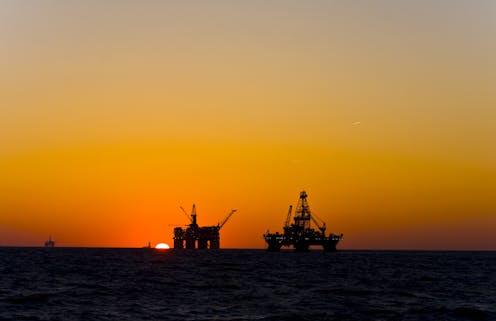New Zealand puts an end to new permits for exploration of deep-sea oil and gas reserves
- Written by James Renwick, Professor, Physical Geography (climate science), Victoria University of Wellington

The New Zealand government’s announcement that it will not issue any new permits for offshore exploration for oil and gas deposits is exciting, and a step in the right direction.
We know that we can’t afford to burn much more oil if we want to meet the Paris Agreement target of keeping global temperature rise this century well below two degrees above pre-industrial levels. Almost all of the already known reserves must stay in the ground, and there is no room to go exploring for more.
Pursuing further reserves would only lead to stranded assets and would waste time and resources in the short term.
Read more: Why New Zealand should not explore for more natural gas reserves
Moving away from fossil fuels
New Zealand currently has 31 active permits for oil and gas exploration, and 22 of these are offshore. A program set up by the previous government invites bids each year for new onshore and offshore exploration permits. But this year it is restricted to the onshore Taranaki Basin, on the west coast of the North Island.
Complementing the move to shut down the exploration of new deep-sea fossil fuel reserves, the government’s new transport funding plan aims to reduce demand for fossil fuels by putting emphasis on public transport, cycling and walking.
This gets away from the outdated mantra of more roads and more cars that we have seen over the past decade and will tackle the transport sector, which has seen very rapid growth in emissions since 1990. This will help New Zealand onto a low-carbon pathway and promises a more people-focused future.
New Zealand is a small player in global emissions of greenhouse gases but our actions can carry symbolic weight on the world stage. Given our present position of 80% renewable electricity and an abundance of solar, wind, wave and tidal energy, if any country can become zero-carbon, surely New Zealand can. It can only benefit New Zealand - socially, economically and politically - to lead in this crucial race to stabilise the climate.
Read more: A new approach to emissions trading in a post-Paris climate
Rising emissions
As the government announced its ban on new offshore exploration permits, the latest greenhouse gas inventory was also released, showing some good news. New Zealand’s gross emissions went down slightly from 2015 to 2016.
But gross emissions are up nearly 20% since 1990, and net emissions (actual emissions minus the “sinks” from forestry) are up 54% over that time. The main factors that contributed to the increase were dairy intensification and increased transport and energy emissions.
Even though agriculture is still the largest source of emissions overall, energy and transport are close behind. We have seen a near-doubling in carbon dioxide emissions from road transport over the past 27 years.
It is encouraging to see a decrease in emissions from the waste sector. Per head of population, New Zealanders throw away significantly above the OECD average of rubbish, a lot of which is green waste that decomposes and releases methane, another potent but short-lived greenhouse gas.
While New Zealand emits a tiny fraction of the world’s greenhouse gases, on a per-capita basis we are sixth-highest among developed countries. We have as much responsibility as any country to reduce our emissions.
Even though emissions have risen, we are set to meet our national target for 2020 (a 5% reduction on 1990 levels) because of “carry-over” credits from the first Kyoto reporting period from 2008 to 2012. But to live up to more stringent future targets, we need a lot more action than we’ve seen over the last decade. The government plans to introduce zero-carbon legislation that will commit New Zealand to reaching the goal of carbn neutrality by 2050.
This will require serious investment and commitment to renewable technologies, changes in the transport sector, changes to agriculture and land use, and ultimately changes in the way we all live our lives.
Authors: James Renwick, Professor, Physical Geography (climate science), Victoria University of Wellington



















